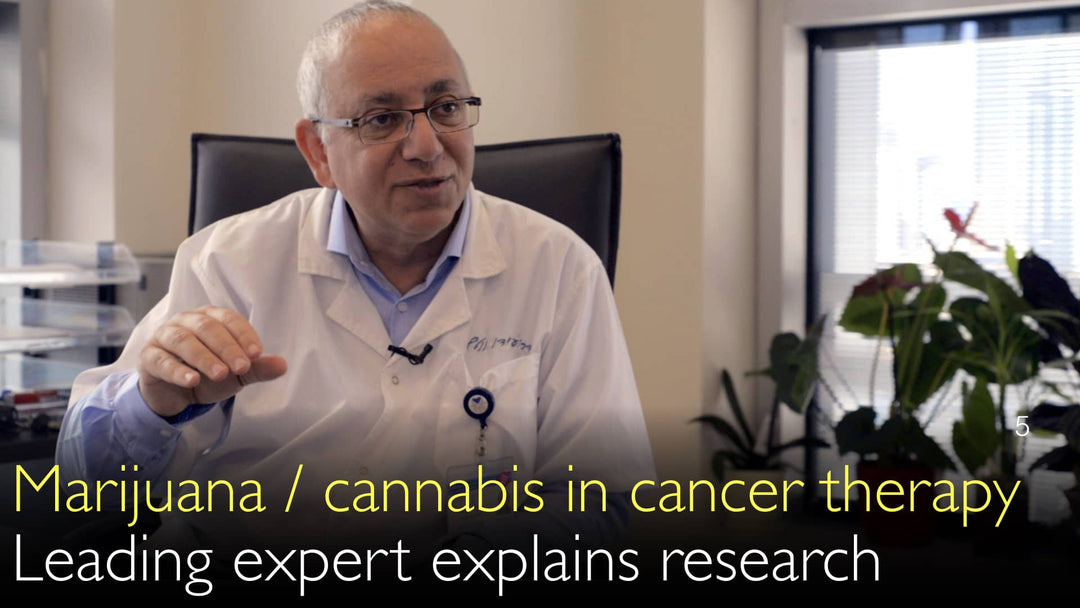Leading expert in oncology, Dr. Ido Wolf, MD, explains the role of medical cannabis in cancer care. His research in Israel analyzes real-world patient data. Dr. Wolf finds cannabis is effective for about half of cancer patients. It helps alleviate symptoms like pain, nausea, and loss of appetite. Cannabis is not a cancer treatment but a palliative medication. It can improve quality of life for some individuals. Side effects like dizziness are possible, especially in elderly patients.
Medical Cannabis for Cancer Symptom Relief: Efficacy and Patient Outcomes
Jump To Section
- Cancer Cannabis Research in Israel
- Medical Marijuana Efficacy Data
- Cannabis Symptom Relief in Cancer
- Cannabis Side Effects in Elderly
- Palliative Care Cannabis Benefits
- Full Transcript
Cancer Cannabis Research in Israel
Dr. Ido Wolf, MD, conducts his research on medical cannabis in Israel. This country provides a unique environment for study. Medical cannabis is legal and supplied to patients with permits from the Ministry of Health. Dr. Anton Titov, MD, discusses this research framework with the oncology expert. Dr. Wolf's team analyzes clinical data from many cancer patients who receive cannabis treatment. Their approach is vital due to a global lack of large-scale, evidence-based data.
Medical Marijuana Efficacy Data
Dr. Ido Wolf, MD, emphasizes the absence of Phase 3 clinical trials for medical cannabis. This gap in scientific evidence makes patient-reported outcomes crucial. His methodology involves directly asking patients about their experiences. The team also reviews medical files to compare outcomes between users and non-users. This real-world evidence helps build a clearer picture of cannabis efficacy. Dr. Wolf's work provides valuable insights beyond traditional clinical trial settings.
Cannabis Symptom Relief in Cancer
Medical cannabis shows significant efficacy in alleviating specific cancer symptoms. Dr. Ido Wolf, MD, identifies key areas where patients report improvement. These include a notable reduction in cancer-related pain. Cannabis also acts effectively against chemotherapy-induced nausea and vomiting. Another benefit is helping with cancer-related loss of appetite. It is important to note that cannabis helps about half of the patients who use it. Dr. Anton Titov, MD, and Dr. Wolf confirm these findings are for symptom management only.
Cannabis Side Effects in Elderly
Dr. Ido Wolf, MD, provides a balanced view by discussing potential side effects. Not every patient has a positive experience with medical cannabis. Some individuals report adverse effects from its use. Common side effects include feelings of dizziness. Another concern is that cannabis can sometimes make a patient's walk unstable. These side effects are particularly prevalent among elderly cancer patients. This highlights the need for careful, personalized dosing and monitoring by oncologists.
Palliative Care Cannabis Benefits
The primary value of medical cannabis lies in palliative care. Dr. Ido Wolf, MD, is clear that it is not a treatment for cancer itself. Oncologists mostly prescribe it for palliation to improve patient comfort. The goal is to enhance the quality of life for individuals undergoing difficult treatments. By reducing debilitating symptoms, cannabis helps patients tolerate their cancer therapy better. Dr. Wolf's research confirms that for a substantial group, it serves as a very good palliative medication.
Full Transcript
Medical use of marijuana and cannabis is widespread, but scientific evidence of its efficacy against many symptoms of cancer is incomplete. A leading cancer expert discusses his research on cannabis efficacy in alleviating cancer symptoms. Can cannabis alleviate side effects of cancer treatment?
Dr. Anton Titov, MD: You study the medical effects of marijuana use. You study perceived efficacy and side effects of marijuana use in people who are being treated for cancer. What did your studies show?
Dr. Ido Wolf, MD: We look at clinical data regarding treatment with medical cannabis simply because in Israel many cancer patients received cannabis treatment. It is legal in Israel and it is supplied. Patients get permits from the Ministry of Health.
We try to see how medical cannabis, first of all, if it is effective at all. How patients take it, how they define if it is beneficial or not. This is important because there is not too much evidence-based data about medical cannabis.
There are no Phase 3 trials, for example, that show whether marijuana is effective or not. What we do is we simply go and ask the patients. We try to go through the medical files and see what happened to those who took or did not take medical cannabis.
We see that marijuana is effective in some patients. It is affecting mostly symptoms. We don't think that marijuana affects cancer progression. I don't think that it is a good cancer therapy.
But it can definitely help some patients, for example, by alleviating pain, acting against nausea and vomiting. There are some symptoms that can be positively affected by using medical cannabis.
It is good for some of the patients, but not all of them. Some patients take the cannabis and it causes them side effects, especially the elderly. Cannabis can cause some dizziness, sometimes making walk unstable.
But we know that for some patients cannabis is a very good palliative medication. We looked at cancer patients who received the cannabis from their oncologists, mostly for palliation.
We saw that in about half of the patients cannabis helps them mostly in the palliative setting. That means less pain, less nausea and vomiting, sometimes cannabis helps with loss of appetite.
We don't think that marijuana is a good treatment against cancer itself, but it can sometimes help to improve the quality of life of cancer patients.




